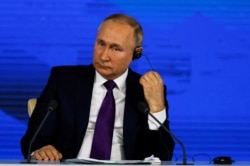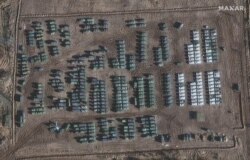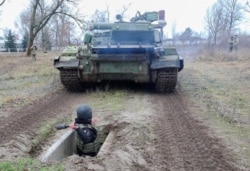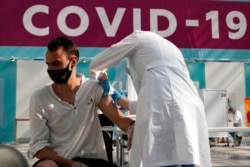President Vladimir Putin has demanded that the West provide Russia with security guarantees “immediately” amid spiraling tensions involving a massive deployment of Russian troops toward Ukraine.
Speaking at his annual news conference on December 23, Putin responded testily to a reporter’s question about Russia’s intentions, listing off a litany of grievances about Ukraine and about NATO.
He also referred to a list of demands that Russian officials released publicly earlier this month that amounted to a major restructuring of European security and NATO's policies.
“You should give us guarantees. You! And without any delay! Now!” he said, responding to a question from a Sky News reporter.
Putin repeated past Kremlin assertions that the United States had placed missile systems on Russia’s border.
He appeared to be referring to the anti-missile Aegis Ashore systems that the United States has deployed to NATO allies Romania and Poland in recent years. Washington has insisted that the systems are needed to defend Europe against threats from Iran’s missiles, and are ineffective against Russia’s arsenal.
“Is it us who placed missiles next to the U.S. borders?” Putin said, responding to another question. “No. It is the U.S. with its missiles who came to our home and are on the threshold of our home….Is it an unusual demand? Do not place any more assault systems next to our home? What is unusual about it?”
Responding to an earlier question, Putin appeared to give a positive signal regarding proposed upcoming talks between Russia, the United States, and possibly other Western allies.
U.S. and Russian diplomats are tentatively scheduled to meet for new talks, reportedly in Geneva, sometime after the New Year.
"We have so far seen a positive reaction,” he said. “Our U.S. partners told us that they are ready to begin this discussion, these talks, at the very start of next year.”
“I hope that’s how it will all play out,” he said.
The Russian demands, released publicly on December 17, call for prohibiting NATO from expanding further to the east and leaving Ukraine and several other countries as buffer states with limited sovereignty when it comes to military affairs.
In recent weeks, the United States, NATO, and Kyiv have raised the alarm over around 100,000 Russian troops deployed near the border with Ukraine and in the Russian-occupied Crimean Peninsula.
U.S. officials have said Moscow is planning for a possible military offensive that, if it happens, could come within weeks.
The new military buildup has become the backdrop for Putin's push for the United States and NATO to give Russia sweeping "security guarantees" that would drastically alter the post-Cold War order in Europe.
Putin has said he does not want a war but has been adamant that if new fighting breaks out, it will be the fault of Kyiv and the West.
During the news conference, he also repeated past accusations against Ukraine, asserting that Kyiv was preparing a new military offensive in the eastern regions where war has been ongoing for more than 7 years now.
"Now they tell us, war, war, war. It seems they are preparing another operation [in Donbas] and are warning us not to get in the way, or there'll be sanctions," Putin said. He also accused the West of creating "anti-Russia" sentiment in Ukraine by arming it and "brainwashing the population."
"We are doing our best to establish good-neighborly ties with Ukraine. But it is impossible to do so with the current leadership. People in Ukraine who want to work with us are facing pressure or even being killed,” he said.
The news conference is one of three carefully orchestrated, nationally televised public events that Putin holds almost every year, as part of an effort to showcase his dominance of Russia’s political life.
In past years, press conferences have gone more than three hours; the longest was last year, at 4 1/2 hours.
Because of pandemic restrictions, journalists were required to submit three negative PCR tests in order to enter the hall. Organizers also set up “disinfection tunnels” — a unproven technology that sprays individuals with a disinfectant as they walk through.
Earlier in the news conference, Putin extolled his government's efforts in fighting the COVID-19 pandemic, and bolstering the country’s economic growth.
Like many countries, Russia has struggled to get its COVID-19 infections under control — an effort that has been hampered by widespread vaccine hesitancy.
Less than 50% of the country’s 146 million people have been fully vaccinated so far, even though Russia was the first in the world to approve and release a coronavirus vaccine a year ago. As of December 23, Russia has reported 10.2 million cases, and 300,000 deaths, according to the national coronavirus information center.
"After facing the coronavirus infection's challenges and the necessary restrictions caused by it in the economy, as well as in the social sphere, our economy, turned out to be more mobilized and better prepared for such shocks than the world's other developed economies,” he said.








